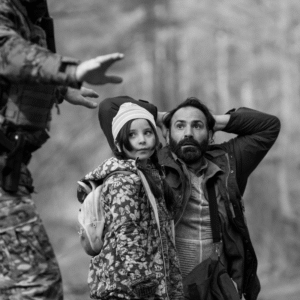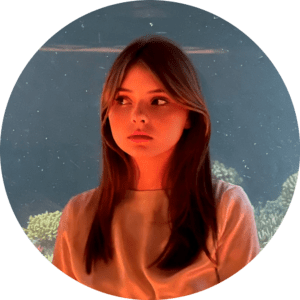15-year-old Helena Bruździak reviews Agnieszka Holland’s award-winning refugee movie Green Border

‘Green Border’ (2023) directed by Agnieszka Holland.
Picture by: Marlene Film Production, s.r.o.
Article link copied.
15 August 2025
Haunting portrayal of the refugee crisis in the Polish forests

Watching the movie Green Border (2023) transformed the way I view the refugee crisis. It revealed how deeply entrenched this issue has become in modern times, and drove home just how urgent it is to reform refugee policies.
Directed, co-written and produced by award-winning filmmaker Agnieszka Holland, Green Border dramatises the geopolitical stand-off on the Poland–Belarus border.
Harbingers’ Weekly Brief
In 2021, the Belarusian government shuttled desperate refugee families from Syria, Afghanistan and North Africa to their border with Poland, promising them a better life in the European Union. But the Polish authorities refused them entry and pushed them back into the forest, trapping these men, women and children in a dangerous game of human ping-pong.
The film showcases the refugee crisis through three simple but powerful viewpoints: a Syrian family caught between the two countries; a Polish border officer; and an activist. It reveals how the refugees are used as political pawns by two rival nations, Poland and Belarus. The forest itself is almost a character, and the film does not shy away from portraying the freezing weather and brutal conditions.
Holland, whose previous films include Europa Europa(1990) and In Darkness(2011), is one of Poland’s most celebrated filmmakers. She is renowned for tackling morally complex subjects and blending historical realism with deeply emotional narratives.
With Green Border she returns to her roots in political cinema, offering a raw look at Europe’s border policies through a human rights lens. The film wonthe Special Jury Prize at the 2023 Venice Film Festival.
What makes Green Border so compelling is its multi-perspective storytelling. These intersecting viewpoints allow the audience to see the human cost of policy decisions, the moral dilemmas of those working within oppressive systems, and the bravery of ordinary people who choose compassion over obedience.
One particularly jarring moment, revealing the political motives behind the story, is when the Polish border guard, Jan, is briefed by a superior. He explains to Jan that the refugees are “not people – they are weapons used by Putin and [Belarus’s president] Lukashenko”. Jan gradually realises how brutal and horrible his and his coworkers’ actions are, and he starts to question his superiors.
The film is shot in black and white – a very striking and bold artistic choice.
The absence of color strips the visuals down to their emotional and thematic core. It also serves as a symbolic gesture, highlighting how issues that are often viewed in black-and-white political terms (legal vs illegal, border vs no border) are, in reality, far more nuanced and human. Also, the characters themselves navigate moral grey areas.
Released just weeks before Poland’s 2023 parliamentary elections, Green Border sparked a major controversy. The far-right Law and Justice (PiS) party, then in power, criticised it heavily, with justice minister Zbigniew Ziobro comparing the film to Nazi propaganda and calling it “anti-Polish”.
The country’s president Andrzej Duda, also from PiS, said that “only pigs sit in the theatres” (referring to those who watched the movie) and criticised it for its negative portrayal of Polish border guards. In response, the Centre for Monitoring Racist and Xenophobic Behavior filed a lawsuit against him.
Despite the controversy, Green Border is a vital film that humanises those who are stripped of their identity in public discourse. It reminds us that behind the headlines are real families and people seeking safety. The film does not offer an easy answer as to who is a villain in the story.
Green Border is a wake-up call. A difficult yet important watch, it’s a testament to cinemas ability to change minds and hearts.
Written by:

Writer
Warsaw, Poland
Helena Bruździak was born in 2009 in Warsaw, Poland. She is passionate about writing, with a particular interest in history and English at school, and aspires to study law in the future. In March 2025, she launched a human rights subsection for the magazine called, Crisis Zones, alongside her peer, Kexin Shi, where they aim to raise awareness among young people about the challenges refugees and displaced people face.
In her free time, she enjoys listening to music, playing the piano, and reading poetry.
Helena speaks English and Polish, and is currently learning French.
Edited by:

🌍 Join the World's Youngest Newsroom—Create a Free Account
Sign up to save your favourite articles, get personalised recommendations, and stay informed about stories that Gen Z worldwide actually care about. Plus, subscribe to our newsletter for the latest stories delivered straight to your inbox. 📲
© 2026 The Oxford School for the Future


